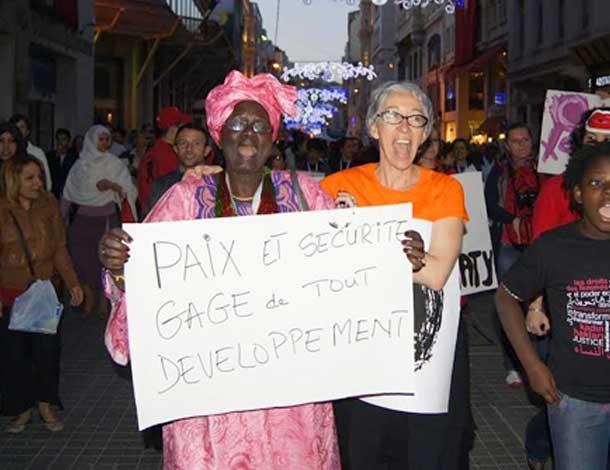In 2008, for the 11th Forum in Cape Town, Genre en Action (Gender in Action) launched a mobilization in partnership with AWID, which increased francophone participation. The project was recreated in 2012 for the 12th Forum in Istanbul, by way of the Francophone Village. For the 13th Forum in Brazil in 2016, we are determined to pursue these efforts. But what have we learned since Cape Town?
The role of Francophones at the AWID Forum
AWID was launched in 1983. I first heard about it in 2002. Two activist friends were returning from the ninth AWID Forum in Mexico, happy with the experience but disheartened with the absence of francophones‐ “There were two of us,” they commented, “maybe three.”
I went to the tenth AWID Forum in Bangkok in 2005, invited by Bridge (University of Sussex/Brighton, GB) as a member of the international steering committee.
What I had in mind was making new connections to develop the Genre en Action network, newly formed at the end of 2003. But I was faced with disappointment: barely 40 Francophones were present (80 francophone registrations out of a total of 2,000). Of the hundreds of sessions taking place during the four days, only eight had French‐speaking presenters and only three sessions were organized by Francophones (Senegal, Rwanda, DRC). There were no Francophones in the plenaries nowhere near good enough. Something had to be done!
In 2008, for the 11th Forum in Cape Town, Genre en Action launched a mobilization in partnership with AWID, which doubled francophone participation: over 100 Francophone participants were present! With the support of the International Organisation of La Francophonie (IOF) and the Swiss Agency for Development and Cooperation, Genre en Action funded 50 Francophones, ensured broad media coverage in French, and organized one session and two caucuses. The project was recreated in 2012 for the 12th Forum in Istanbul, through the Francophone Village. For the 13th Forum in Brazil in 2016, we are determined to continue to pursue these efforts. But what have we learned since Cape Town?

Expanding beyond Francophone circles
Firstly, francophone feminist and women’s organizations are fond of international exchanges and want to expand beyond “Francophone circles”. Calls for mobilization were very successful, and the applications far exceeded our means.
Secondly, language barriers are real: English dominates and Francophones are left on the margins of the international network of ideas and organizations. The Francophone Village was an attempt at openness, but French is even more difficult for non‐ Francophones than the other way around! Also, in Cape Town and Istanbul, we found that feminist debates that enliven, or divide, feminist movements “elsewhere” are marginal, if not taboo in francophone communities, especially in Africa: contraception, abortion, diverse sexualities (LGBTIQ, sex work/prostitution), masculinity, intersectionality. As a result, francophone feedback and concerns sometimes appear as “backward”. In fact, in Cape Town and Istanbul, few francophone sessions were selected (according to proposal evaluators, they are not innovative enough) and (still) no Francophones in the plenaries!
Finally, it seems that Francophones are more interested in anglophone topics than the other way around (with the exception of “women from the Arab Spring”). In the end, “the rest of the world” is unaware of the concerns, challenges and strategies of francophone women, especially African women. So many challenges for Genre en Action!
Shedding Light on our Specific Challenges
The contexts of francophone Africa (Northern and Sub‐Saharan) are very different from Asian or Latin American contexts, even from East Africa. There are no BRICS countries (‘emerging economies’ such as Brazil, Russia, India, China and South Africa) in West Africa and rural issues are central concerns, especially women’s access to basic infrastructures. Crucial challenges for francophone feminists (such as female genital mutilation, rape as a weapon of war, the combination of religion/tradition, land conflicts between nomads and farmers, the weight of French Africa in the economy) are poorly known “elsewhere”. The AWID Forum can help shed some light, provided that organizations find a space to talk, and “others” come to listen.
However, the selection process for the AWID Forum is very competitive. Francophone “branches” of international organizations are better represented than solely local/national organizations, who need information, resources, and connections. How can we bring in new faces and voices ”, and ensure the crucial renewal of ideas and generations?
One might think that in francophone countries, gender has been tamed, that it’s become the work of “big” NGOs, institutions, even States, rather than feminist uprisings. It may seem that the demands of feminist activists, particularly those that challenge States, are numbed by UN processes and “funders” and collusion between civil society and governments. But under this façade, I am convinced that there are vibrant, young and free francophone feminist forces. They all have their place at the AWID Forum, in the global village of feminisms!
About the author
A multifaceted feminist and co-founder and President of the French network Genre en Action from 2009 to 2014, Claudy Vouhé promotes the convergence of activists and professionals taking action on gender equality ( not simply on women’s rights or equality between women and men). She is committed to working in a cross-cutting and multidisciplinary manner, at various levels.
